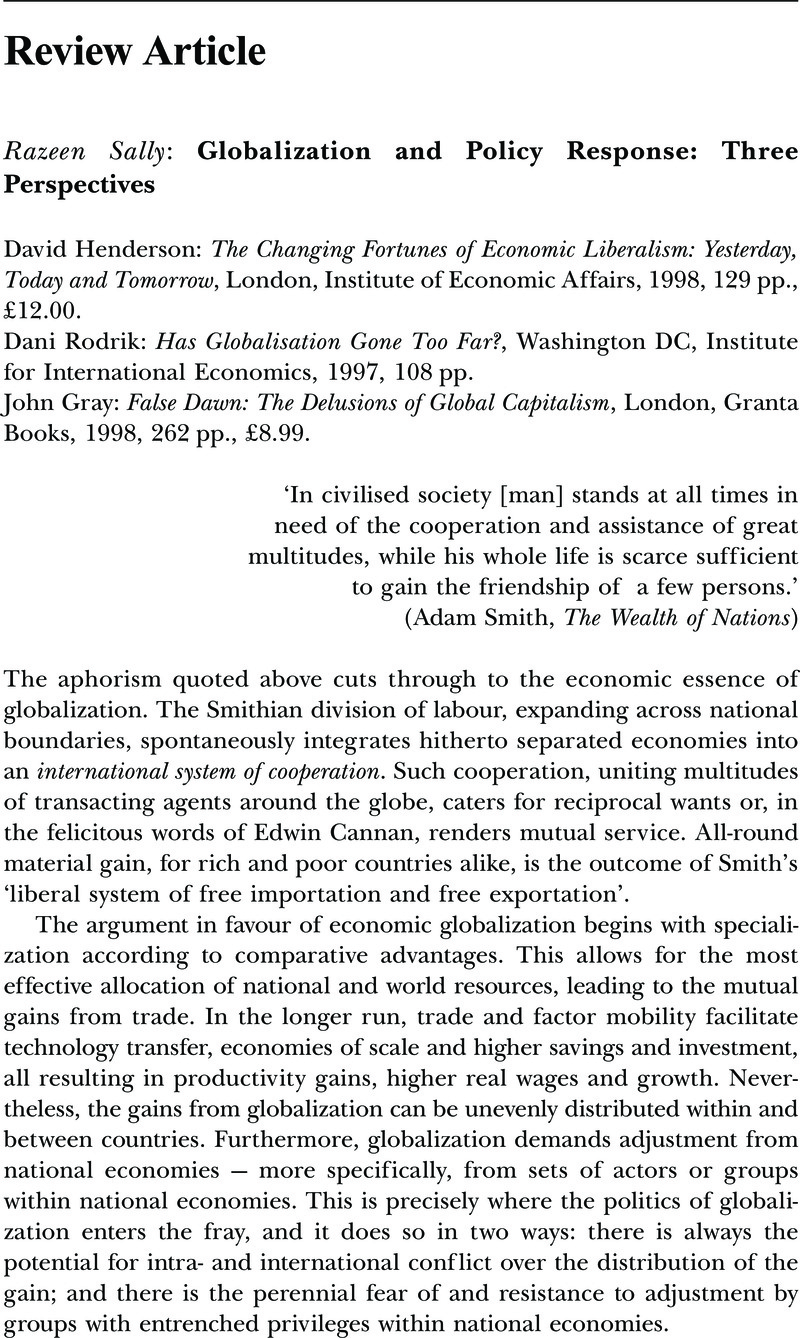Article contents
Globalization and Policy Response: Three Perspectives
Published online by Cambridge University Press: 28 March 2014
Abstract

- Type
- Review Article
- Information
- Copyright
- Copyright © Government and Opposition Ltd 2000
References
1 Tumlir, Jan, Economic Policy as a Constitutional Problem, London, Institute of Economic Affairs, 1984, pp. 16–22.Google Scholar
2 Tumlir, Jan, ‘International Economic Order and Democratic Constitutionalism’, Ordo, 34 (1983), pp. 76–7Google Scholar; Sally, Razeen, Classical Liberalism and International Economic Order: Studies in Theory and Intellectual History, London, Routledge, 1998, pp. 59–60.Google Scholar
3 Ruggie, John Gerard, ‘International Regimes, Transactions and Change: Embedded Liberalism in the Postwar Economic Order’, International Organisation, 36:2 (Spring 1982), pp. 209–31.CrossRefGoogle Scholar
4 Ruggie, John Gerard, ‘At Home Abroad, Abroad at Home: International Liberalization and Domestic Stability in the New World Economy’, Millennium: Journal of International Studies, 24:3 (Winter 1995), pp. 508–26.CrossRefGoogle Scholar
5 There is a burgeoning anti-globalization literature. Among the better known statements are George Soros, The Crisis in Global Capitalism: Open Society Endangered, New York, BBS/Public Affairs, 1998; Martin, Hans-Peter and Schumann, Harald, The Global Trap: Globalization and the Assault on Prosperity and Democracy, New York, Zed Books, 1997.Google Scholar
6 For previous treatments, see his BBC Reith lectures of 1985, published as Innocence and Design: The Influence of Economic Ideas on Policy, London, Blackwell, 1986, and A New Age of Reform”?, London, Institute of Fiscal Studies, 1989.
7 David Henderson, The Changing Fortunes of Economic Liberalism, p. 11.
8 Ibid., pp. 58–60.
9 Ohmae, Kenichi, The Borderless World, New York, Harper Collins, 1990.Google Scholar
10 Henderson, op. cit., pp. 61–3. Also see Henderson, David, ‘International Economic Integration: Progress, Prospects and Implications’, International Affairs, 68:4 (1992), pp. 633–53.CrossRefGoogle Scholar
11 See, notably, Maddison, Angus, Monitoring the World Economy, 1820–1992, Paris, OECD Development Centre, 1995.Google Scholar Also see IMF World Economic Outlook, May 1997, Washington DC, IMF, Historical Annex, pp. 112–16.
12 Henderson, , The Changing Fortunes of Economic Liberalism, pp. 58, 60–61.Google Scholar
13 Strange, Susan, The Retreat of the State: The Diffusion of Power in the World Economy, Cambridge, Cambridge University Press, 1996.CrossRefGoogle Scholar
14 Henderson, op. cit., pp. 63–65.
15 For an interpretation of globalization that emphasizes the differences between now and then, see Michael D. Bordo, Barry Eichengreen and Douglas A. Irwin, Is Globalisation Today Really Different Than a Hundred Years Ago?, NBER Working Paper7195 (June 1999), http://www.nber.org/papers/w7195.
16 On the classical liberal view of international economic integration and the nation-state, see Sally, Classical Liberalism, op. cit., pp. 59–60.
17 Henderson, The Changing Fortunes of Economic Liberalism, p. 118. (Italics in the text.)
18 Ibid., pp. 111–21.
19 Dani Rodrik, Has Globalisation Gone Too Far”?, p. 2.
20 Ibid., pp. 4–5.
21 Ibid., pp. 14–27.
22 Ibid., pp. 50–55, 64.
23 Ibid., p. 27.
24 Open Markets Matter: The Benefits of Trade and Investment Liberalisation, Paris, OECD, 1998, pp. 73–75.
25 Ibid., pp. 88–89, 106–107.
26 Henderson, The Changing Fortunes, p. 52.
27 Rodrik, Has Globalization Gone Too Far”?, pp. 73, 81–85.
28 See Gray, John, Liberalisms: Essays in Political Philosophy, London, Routledge, 1989.Google Scholar
29 John Gray, False Dawn, pp. 2–3, 20–21, 211, 218.
30 Ibid., pp. 88, 214, 232.
31 Ibid., p. 80–81.
32 See note 25.
33 Gray, False Dawn, pp. 81–82.
34 See Paul Krugman’s (characteristically) searing review of False Dawn: http://web.mit.edu/krugman/www.gray.html
35 Gray, op. cit., p. 86.
36 There is really no need for a citation here; any economics student knows this from basic textbooks.
37 Gray, op. cit., p. 88.
38 See note 26.
39 Gray, op. cit., pp. 55–77.
40 Ibid., pp. 61–62.
41 Ibid., pp. 23, 200.
42 On both points, see Henderson, The Changing Fortunes, pp. 58–63.
43 See Henderson’s, David review of False Dawn in his ‘The Changing International Economic Order: Rival Visions of the Coming Millennium’, International Finance, 2:3 (1999).Google Scholar
44 Gray, False Dawn, p. 18.
45 Ibid., p. 1–2, 7ff.
46 See Sally, op. cit., ch. 2.
Gray’s misreading of classical liberalism is illustrated by the following: ‘… when Adam Smith founded classical economics on the premise of the rational “economic” man …’. Gray, op. cit., p. 13. Nowhere in The Wealth of Nations is there any mention of homo oeconomicus; it crops up for the first time — and then only impressionistically - in J. S. Mill’s Principles. Gray’s previous work does, however, display a more sophisticated awareness of the classical liberal tradition. See his Liberalisms: Essays in Political Philosophy, London, Routledge, 1989.
47 Gray, False Dawn, pp. 93–94.
48 Sally (1998), chapter 6. Also see Sally, Razeen, ‘The Economics and Politics of the German Miracle’, Government and Opposition, 30:4 (Autumn 1996), pp. 541–52.CrossRefGoogle Scholar
If readers are not willing to take me at my word, they are free to consult the writings of the Founding Fathers of German neoliberalism, either in the original German or in the few translations readily available.
49 See note 34.
50 Gray, False Dawn, p. 82.
51 For what it is worth, I happen to disagree and believe that free markets are the best political-economic means of promoting well-being for the vast majority of individuals across the world, both by increasing all-round material wealth and by widening the range of individual choice.
52 Henderson The Changing Fortunes, pp. 82–86.
53 A key in Krugman’s, Paul Pop Internationalism, Cambridge Mass., MIT Press, 1996.Google Scholar
54 English-English for Henderson; hard-boiled, chatty American-English for Krugman.
- 2
- Cited by


